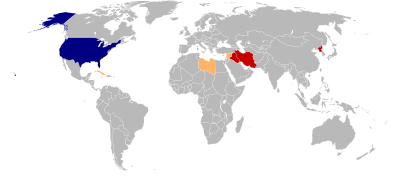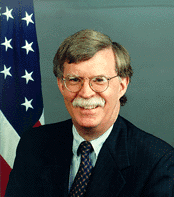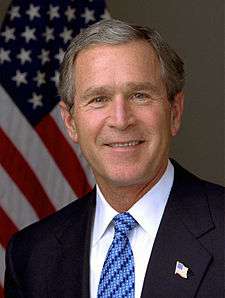Axis of evil

"Beyond the Axis of Evil" included Cuba, Libya, and Syria (yellow). The United States is blue.
The term "axis of evil" was used by U.S. President George W. Bush in his State of the Union address on January 29, 2002, and often repeated throughout his presidency, to describe governments that his administration accused of sponsoring terrorism and seeking weapons of mass destruction. Iran, Iraq, and North Korea were portrayed by George W. Bush during the State of the Union as building nuclear weapons. The notion of such an axis was used to pinpoint these common enemies of the United States and rally the American populace in support of the War on Terror.
2002 State of the Union
In his 2002 State of the Union Address, Bush called North Korea "A regime arming with missiles and weapons of mass destruction, while starving its citizens."[1] He also stated Iran "aggressively pursues these weapons and exports terror, while an unelected few repress the Iranian people's hope for freedom."[1] Of the three nations Bush cited, however, he gave the most criticism to Iraq.[1]
He stated "Iraq continues to flaunt its hostility toward America and to support terror. The Iraqi regime has plotted to develop anthrax and nerve gas and nuclear weapons for over a decade. This is a regime that has already used poison gas to murder thousands of its own citizens, leaving the bodies of mothers huddled over their dead children. This is a regime that agreed to international inspections, then kicked out the inspectors. This is a regime that has something to hide from the civilized world."[1] Afterwards, Bush said, "States like these and their terrorist allies constitute an axis of evil, arming to threaten the peace of the world."[1]
David Frum
The phrase was attributed to former Bush speechwriter David Frum, originally as the axis of hatred and then evil. Frum explained his rationale for creating the phrase axis of evil in his book The Right Man: The Surprise Presidency of George W. Bush. Essentially, the story begins in late December 2001 when head speechwriter Michael Gerson gave Frum the assignment of articulating the case for dislodging the government of Saddam Hussein in Iraq in only a few sentences for the upcoming State of the Union address. Frum says he began by rereading President Franklin D. Roosevelt's "date which will live in infamy" speech given on December 8, 1941, after the Japanese surprise attack on Pearl Harbor. While Americans needed no convincing about going to war with Japan, Roosevelt saw the greater threat to the United States coming from Nazi Germany, and he had to make the case for fighting a two-ocean war.
Frum points in his book to a now often-overlooked sentence in Roosevelt's speech which reads in part, "...we will not only defend ourselves to the uttermost but will make very certain that this form of treachery shall never endanger us again." Frum interprets Roosevelt's oratory like this: "For FDR, Pearl Harbor was not only an attack—it was a warning of future and worse attacks from another, even more dangerous enemy." Japan, a country with one-tenth of America's industrial capacity, a dependence on imports for its food, and already engaged in a war with China, was extremely reckless to attack the United States, a recklessness "that made the Axis such a menace to world peace", Frum says. Saddam Hussein's two wars, against Iran and Kuwait, were just as reckless, Frum decided, and therefore presented the same threat to world peace.
In his book Frum relates that the more he compared the Axis powers of World War II to modern "terror states", the more similarities he saw. "The Axis powers disliked and distrusted one another", Frum writes. "Had the Axis somehow won the war, its members would quickly have turned on one another." Iran, Iraq, al-Qaeda, and Hezbollah, despite quarreling among themselves, "all resented power of the West and Israel, and they all despised the humane values of democracy." There, Frum saw the connection: "Together, the terror states and the terror organizations formed an axis of hatred against the United States."
Frum tells that he then sent off a memo with the above arguments and also cited some of the atrocities perpetrated by the Iraqi government. He expected his words to be chopped apart and altered beyond recognition, as is the fate of much presidential speechwriting, but his words were ultimately read by Bush nearly verbatim, though Bush changed the term axis of hatred to axis of evil. North Korea was added to the list, he says, because it was attempting to develop nuclear weapons, had a history of reckless aggression, and "needed to feel a stronger hand".[2]
Afterwards, Frum's wife disclosed his authorship to the public.[3]
Yossef Bodansky
A decade before the 2002 State of the Union address, in August 1992, the political scientist Yossef Bodansky wrote a paper entitled "Tehran, Baghdad & Damascus: The New Axis Pact"[4] while serving as the Director of the Congressional Task Force on Terrorism and Unconventional Warfare of the US House of Representatives. Although he did not explicitly apply the epithet evil to his New Axis, Bodansky's axis was otherwise very reminiscent of Frum's axis. Bodansky felt that this new Axis was a very dangerous development. The gist of Bodansky's argument was that Iran, Iraq and Syria had formed a "tripartite alliance" in the wake of the First Gulf War, and that this alliance posed an imminent threat that could only be dealt with by invading Iraq a second time and overthrowing Saddam Hussein.
Development
Bolton: "Beyond the Axis of Evil"

On May 6, 2002, then-Undersecretary of State John R. Bolton gave a speech entitled "Beyond the Axis of Evil". In it he added three more nations to be grouped with the already mentioned rogue states: Cuba, Libya, and Syria. The criteria for inclusion in this grouping were: "state sponsors of terrorism that are pursuing or who have the potential to pursue weapons of mass destruction (WMD) or have the capability to do so in violation of their treaty obligations."[5]
Criticism
Iran and Iraq fought the long Iran–Iraq War in the 1980s under basically the same leadership as that which existed at the time of Bush's speech, leading some to believe that the linking of the nations under the same banner was misguided. Others argued that each of the three nations in the "axis of evil" had some special characteristics which were obscured by grouping them together. Anne Applebaum wrote about the debate over North Korea's inclusion in the group.[6]
In the days after the 9/11 attacks, Crocker and other senior U.S. State Department officials flew to Geneva to meet secretly with representatives of the government of Iran. For several months, Crocker and his Iranian counterparts cooperated on capturing Al Qaeda operatives in the region and fighting the Taliban government in Afghanistan. These meetings stopped after the "Axis of Evil" speech hardened Iranian attitudes toward cooperating with the U.S.[7]
Other axes
In January 2006, Israeli Defense Minister Shaul Mofaz implicated "the axis of terror that operates between Iran and Syria" following a suicide bomb in Tel Aviv.[8]
In April 2006 the phrase axis of terror earned more publicity. Israel's UN Ambassador, Dan Gillerman, cautioned of a new axis of terror—Iran, Syria and the Hamas-run Palestinian government; Gillerman repeated the term before the UN over the crisis in Lebanon.[9] Some three months later Israeli senior foreign ministry official Gideon Meir branded the alleged alliance an axis of terror and hate.[10]
In 2006, Isaias Afewerki, the president of Eritrea, had declared in response to the deteriorating relations with the neighboring countries of Ethiopia, Sudan and Yemen by accusing them of being an "Axis of Belligerence."[11]
The former president of Venezuela, Hugo Chávez, described the so-called New Latin Left as an "axis of good" comprising Bolivia, Chile, Cuba, Ecuador, Nicaragua, Uruguay and Venezuela (all countries now governed by leftist political leaders) and instead "Washington and its allies" as an "axis of evil".[12]
In 2008, The Economist featured an article about the "Axis of Diesel" in reference to a burgeoning alliance of Iran, Russia, and Venezuela. They cite the billions of dollars in arms sales to Venezuela and the construction of Iranian nuclear facilities as well as the rejection of added sanctions on Iran. They did conclude that the benefits of the arrangement were exaggerated, however.[13]
In 2012, geo-strategist and author, William C. Martel, in a short essay for the publication, The Diplomat, wrote of an "Authoritarian Axis", comprising China, Russia, Iran, North Korea, Syria & Venezuela.[14] Following the death of Venezuela's Hugo Chávez in 2013, Martell removed Venezuela from the assigned list of countries, in his subsequent writings about the "axis". Martel's thesis drew criticism from several quarters, with the main arguments cited in opposition to his idea being the lack of cohesion and generally low levels of cooperation shown between the cited countries.[15][16][17]
Several environmental non-governmental organizations, including Friends of the Earth International[18] and Greenpeace,[19] as well as the Green Party of Canada,[20] have dubbed Australia, Canada and United States, the "Axis of Environmental Evil" because of their lack of support for international environmental agreements, particularly those related to climate change.
Media use
Parodies
Various related pun phrases include:
- axis of weasels - mocking certain countries that did not support the 2003 invasion of Iraq
- Axis of Eve - a women's political action group that opposes Bush through satirical expression
- axis of medieval - mockingly criticizes the influence that Bush's Christian religious beliefs had on his political views
- asses of evil - a mocking insult against Bush, Dick Cheney and Donald Rumsfeld
- axles of evil - denouncing sport utility vehicles for their poor fuel efficiency, and several other variations
- coalition of the drilling - mocking the 'coalition of the willing', stating the possible goal behind the "willing" in getting access to the Iraqi oil
- Axes of Evil - the title of a song by the Canadian heavy metal band 3 Inches of Blood
- The Axis of Awesome - an Australian musical comedy act
The term has also lent itself to various parodies, including the following:
- In a Saturday Night Live skit with host Jonny Moseley, George W. Bush played by Will Ferrell expands the "Axis of Evil" (although he doesn't mention North Korea, instead saying "one of the Koreas") to include things with "evil" in it or things he does not understand (including Enron, Tom Daschle, the economy, France, those who "mess with Texas", the "original Axis of Evil", mathematics, Dick Cheney (for now), and Evel Knievel, with the exception of Dr. Evil). Ferrell mispronounces "axis" so it sound like "Access of Evil".
- Serj Tankian, lead singer for the group System of a Down and Tom Morello, guitarist and former guitarist for Rage Against the Machine and Audioslave (respectively) founded a political action group called the Axis of Justice.
- Andrew Marlatt wrote an extensive parody for SatireWire, where Libya, China, and Syria formed the "Axis of Just as Evil" and other countries "rushed to gain triumvirate status" in a "game of geopolitical chairs".[21]
- The Economist ran a 2006 (May 13–19) cover headline titled "Axis of Feeble" about the end of the George Bush-Tony Blair partnership.[22]
- King Dedede, a character from the Kirby series, refers to the titular character as an "axis of evil" in an episode of the Japanese version of the anime.
- In the Top Gear "Middle East Special", during a road trip through Syria, Jeremy Clarkson installs an "Axle of Evil" to make his Mazda MX-5 a six-wheeled vehicle.
Bill Bailey
British Comedian Bill Bailey also referred to the Axis of Evil in his Part Troll tour. He queried whether it was possible to assume a non-evil role within a terrorist organisation, possibly in the laundry or catering department. He then went on to pretend that he was the receptionist for the Axis of Evil. Imagining he was answering the phone, Bill Bailey says to the audience, "Hello, Axis of Evil. Oh no, they're all out at the moment. Oh, I don't know. Doing something evil I suppose". Placing the "caller" on hold, he then played a short jingle for the "Axis of Evil Pension Scheme".
Comedy Tour
In response to the problems Americans of Middle-Eastern descent have in the current climate, a group of comedians have banded together to form the Axis of Evil Comedy Tour. The comedians, Ahmed Ahmed (from Egypt), Maz Jobrani (from Iran), and Aron Kader (whose father is Palestinian), have created a show which currently plays on Comedy Central. They have also included half-Palestinian, half-Italian Dean Obeidallah in some of their acts.
The group recently took the comedy tour around the Middle East (November - December 2007), performing in the UAE, Egypt, Kuwait, Jordan, and Lebanon to sell-out crowds.
Lullabies
In 2003 the Norwegian record label Kirkelig Kulturverksted published the CD Lullabies from the Axis of Evil containing 14 lullabies from Iran, Iraq, North Korea, Palestine, Syria, Afghanistan and Cuba. Every lullaby is presented in its original form sung by women from these countries, and then a western version with interpretations in English.[23]
Other
- "Holidays in the Axis of Evil" is a documentary by BBC.
- Behind Enemy Lines II: Axis of Evil is a direct to video film.
- Empire of Evil (documentary film)
- Team America: World Police comedy film
- The song "Axes of Evil" by 3 Inches of Blood in their album Advance and Vanquish
- In Metal Gear Rising: Revengeance, after Operation Tecumseh, commentators label even allied Pakistan as a member of the axis of evil.
Cosmology
In cosmology, the axis of evil is the pattern that is left imprinted on the radiation left behind by the Big Bang.[24] The pattern itself is an alignment of hot and cold spots in the Cosmic Microwave Background that seemingly defies the standard isotropic model of the Universe. Discovered and named in 2005 by Kate Land and João Magueijo of Imperial College, London, the pattern is controversial and disputed amongst scientists, though two independent studies have confirmed its existence.
See also
- Dual containment (Iran-Iraq)
- Islamic socialism
- Red green alliance
- Pakistan in the War on Terror
- State Sponsors of Terrorism
- Political usages of the term evil
- Rogue state
- Evil Empire
- Coalition of the willing
References
- 1 2 3 4 5 "State of the Union Address (January 29, 2002)". millercenter.org.
- ↑ "Axis of Evil" Authorship Settled! It was Frum and Gerson, and definitely not Bush. January 9, 2003
- ↑ "Proud wife turns 'axis of evil' speech into a resignation letter", Matthew Engel, The Guardian, February 27, 2002
- ↑ Yossef Bodansky & Vaughn S. Forrest on behalf of the House Republican Research Committee (1992-08-10). "Tehran, Baghdad & Damascus: The New Axis Pact". Archived from the original on June 10, 2007. Retrieved 2007-05-22.
- ↑ John R. Bolton (2002-05-06). "Beyond the Axis of Evil: Additional Threats from Weapons of Mass Destruction". Retrieved 2015-09-21.
- ↑ Anne Applebaum (2002-02-12). "North Korea: Threat or Menace?". Slate. Archived from the original on May 25, 2007. Retrieved 2012-06-16. External link in
|publisher=(help) - ↑ Dexter Filkins (September 30, 2013). "Dexter Filkins: Qassem Suleimani, the Middle East's Most Powerful Operative". The New Yorker. Retrieved December 18, 2013.
- ↑ "Israel attacks 'axis of terror'". BBC News. 2006-01-20. Retrieved 2007-05-22. External link in
|publisher=(help) - ↑ "Gillerman fingers 'axis of terror'". Jerusalem Post. 2006-02-22. Retrieved 2007-11-28.
- ↑ "Israel blames Iran and Syria for violence". Gulf Times. July 14, 2006. Archived from the original on September 30, 2007. Retrieved 2007-05-22. External link in
|publisher=(help) - ↑ "parade-magazine-2007-02-17>". Archived from the original on December 2, 2008.
- ↑ Alba Gil (2006-01-05). "Evo Morales hace amigos". AmericaEconomica.com. Retrieved 2007-05-22. External link in
|publisher=(help) - ↑ "An axis in need of oiling". The Economist. 2008-10-23.
- ↑ William C. Martel, The Diplomat. "An Authoritarian Axis Rising?". The Diplomat.
- ↑ "The "Authoritarian Axis" That Doesn't Exist". The American Conservative.
- ↑ "The Return of the "Authoritarian Axis" That Doesn't Exist". The American Conservative.
- ↑ http://muslimvillage.com/2012/07/04/24781/there-is-no-cabal-the-authoritarian-axis-nonsense/
- ↑ Green Group Includes U.S. In 'Axis of Environmental Evil'
- ↑ Peter I Hajnal; John J Kirton, "Sustainability, civil society, and international governance : local, North American, and global contributions" page 344
- ↑ "Canada pressured at UN climate change talks". ctv.ca.
- ↑ Andrew Marlatt (2002-02-01). "Angered by snubbing, Libya, China Syria form Axis of Just as Evil". SatireWire. Archived from the original on May 17, 2007. Retrieved 2007-05-22. External link in
|publisher=(help) - ↑ "George Bush and Tony Blair: The end of a Bush-Blair era". The Economist. 2006-05-11. Archived from the original on April 7, 2007. Retrieved 2007-05-22. External link in
|publisher=(help) - ↑ Erik Hillestad. "?". Kirkelig Kulturverksted. Archived from the original on May 25, 2007. Retrieved 2007-05-22.
- ↑ Zeeya Marili (2007-04-13). "'Axis of evil' a cause for cosmic concern". New Scientist. Archived from the original on May 21, 2007. Retrieved 2007-05-22. External link in
|publisher=(help)
External links
| Wikisource has original text related to this article: |
- 2002 State of the Union Address - President George W. Bush - January 29, 2002
- "AXIS OF EVIL" - PBS Online NewsHour - January 30, 2002
- "US expands 'axis of evil'" - BBC News - Monday, May 6, 2002, 22:40 GMT 23:40 UK
- "How to defeat the Axis of Evil" - Salon.com - October 24, 2002
- Axis of Evil Comedy Troupe, produced by the American-Arab Anti-Discrimination Committee
- Lullabies from the Axis of Evil Recordings of folk tunes by women from the targeted nations, in a production by Erik Hillestad.
- Global Axis of Evil Parody map
